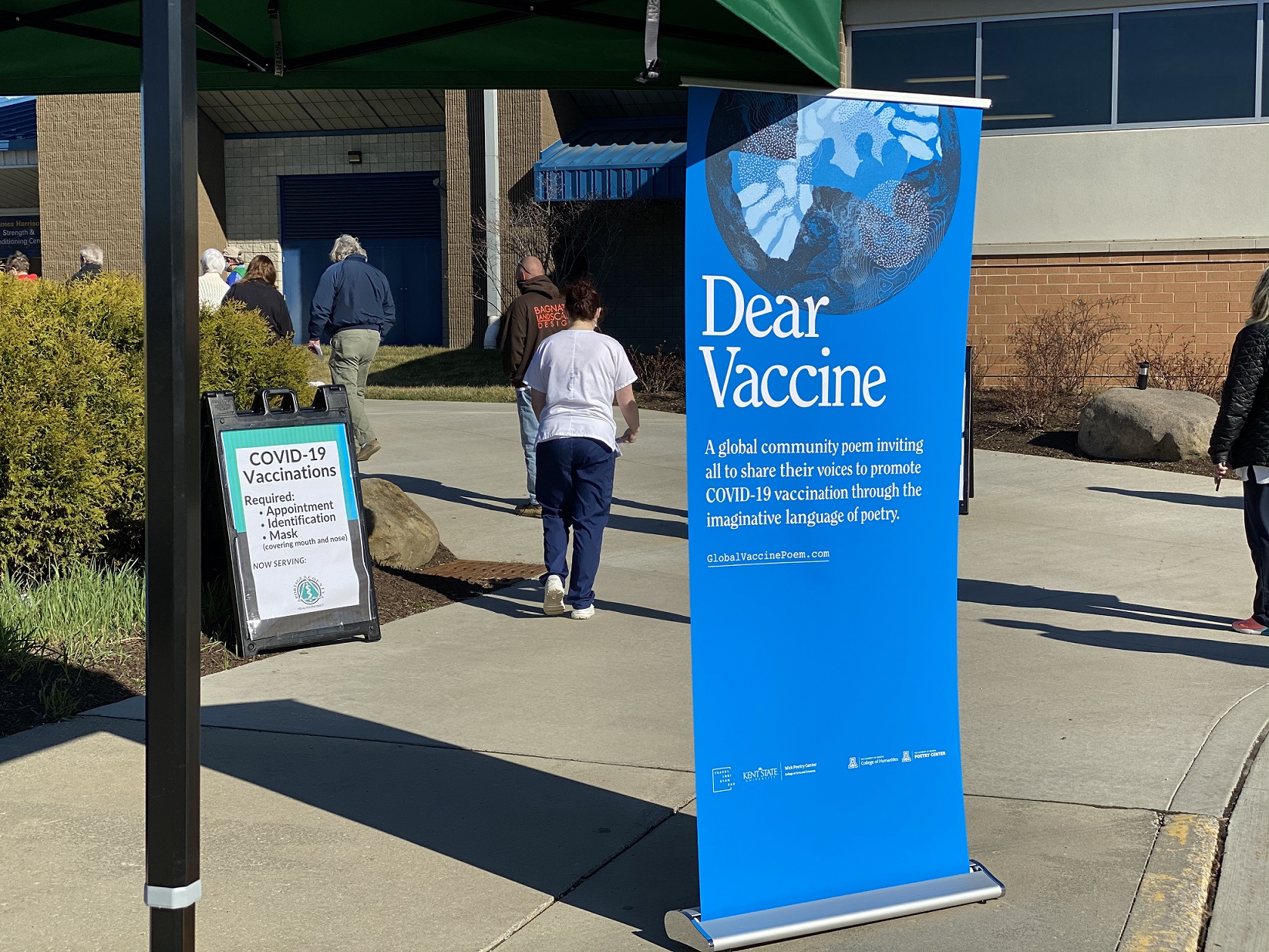Update: Spectrum News 1 recently featured the ongoing project in a June 22 news report. So far, the project has received 1,900 poems from more than 100 countries.
Below is the original story first published April 1, 2021.
What would you say to the COVID-19 vaccine? Would you summarize your experience during the pandemic? Would you focus on your hopes for the future?

The Global Vaccine Poem project is a collaboration between the Wick Poetry Center at Kent State University, housed in the College of Arts and Sciences, and the University of Arizona Poetry Center, housed in the College of Humanities. It offers an inclusive and participatory opportunity during the universal vaccination experience, inviting all to share their voices and promote COVID-19 vaccination through the imaginative language of poetry.
“We know that poetry is a powerful tool to connect us across division, to remind us of both of our individuality and our shared humanity,” said David Hassler, director of Kent State’s Wick Poetry Center. “The Global Vaccine Poem will use creative healing through poetry to encourage all people to re¬flect on both the pandemic and their vaccination, and to imagine a safe and thriving future.”
The project, coinciding with National Poetry Month, is an effort to support both the large-scale vaccination efforts and the personal, individual responses to the historic and encompassing challenges brought on by the COVID-19 pandemic, which experts estimate has infected more than 122 million people and caused more than 2.6 million deaths worldwide.
“Our response must be equally historic and encompassing, using all of our cultural tools to support the vaccination and recovery effort,” Hassler said. “By articulating our most complex and emotional experiences into the language of personal reflection, we harness the ability to transform an individual experience into collective meaning.”
The project already has been embraced by Kent State President Todd Diacon, who submitted this stanza: “The short, sharp pain – a welcomed feeling after a year of dull ache. Memories of a sugar cube soaked with medicine.”
Mandy Munro-Stasiuk, Ph.D., interim dean of Kent State’s College of Arts and Sciences, said the college is proud to be a partner in the Global Vaccine Poem project.
“This community poetry project gives the public an opportunity to articulate and process their feelings about the past year, to share their thoughts and contribute to our collective healing and recovery,” Munro-Stasiuk said.
The project makes use of the 15-minute observation period after a vaccine is administered, a window of time that will be common for all vaccine recipients. Once a vaccine is administered, partner sites will distribute a card describing the project and how to participate, with the choice to respond by hand on the card itself or by using a phone to create a digital response. Those who prefer additional time for reflection can submit their words online via the poem’s website.
Building off the Wick Poetry Center’s innovative online expressive writing tools, participants will then pick one of four different, simple writing prompts in response to four short model poems created by Poetry Foundation’s Young People’s Poet Laureate Naomi Shihab Nye. The prompts, like “Dear Vaccine” and “Vaccine, please,” encourage everyone to participate, regardless of poetic experience. Contributors can share their feelings in English and Spanish.
Once complete, those participating digitally will seamlessly share their personal reflection on the project’s interactive website gallery, creating a collective, community response. Those participating by hand will have the option to mail their card and have their response transcribed and included.
The website’s ever-expanding online gallery of responses can be projected or displayed on large flat screens with rotating displays both at vaccination sites and in public spaces to allow people to read the responses by others and feel inspired to create their own. At any time, the gallery of responses will be available to all at www.globalvaccinepoem.com.
The Wick Poetry Center will formally kick off the project on Tuesday, April 6, at the Kent State Field House, in conjunction with the Portage County Combined General Health District’s mass COVID-19 vaccination event from 10 am. to 4 p.m.,* when volunteers will be passing out postcards to those who have been vaccinated and asking them to submit a stanza of the poem.
The University of Arizona will launch the project on its campus on April 5.
For more information about the Global Vaccine Poem, visit www.globalvaccinepoem.com.
For more information about Kent State’s Wick Poetry Center, visit www.kent.edu/wick.
About the Wick Poetry Center at Kent State University
Established in 1984, Kent State University’s Wick Poetry Center is home to the award-winning Traveling Stanzas project and is one of the premier university poetry centers in the country. It is a national leader for the range, quality and innovative outreach in the community. The center encourages new voices by promoting opportunities for individuals and communities locally, regionally and nationally. The Wick Poetry Center engages emerging and established poets and poetry audiences through readings, publications, workshops and scholarship opportunities.
# # #
*David Hassler will be available for media interviews about the poetry project from 10 a.m. to 2 p.m. April 6, at the Kent State Field House, or you may contact him directly at dhassle1@kent.edu or 330-221-9913.
Media Contact:
David Hassler, dhassle1@kent.edu, 330-221-9913


